The AMD Ryzen Threadripper 3960X and 3970X Review: 24 and 32 Cores on 7nm
by Dr. Ian Cutress, Andrei Frumusanu & Gavin Bonshor on November 25, 2019 9:05 AM ESTCPU Performance: Encoding Tests
With the rise of streaming, vlogs, and video content as a whole, encoding and transcoding tests are becoming ever more important. Not only are more home users and gamers needing to convert video files into something more manageable, for streaming or archival purposes, but the servers that manage the output also manage around data and log files with compression and decompression. Our encoding tasks are focused around these important scenarios, with input from the community for the best implementation of real-world testing.
All of our benchmark results can also be found in our benchmark engine, Bench.
Handbrake 1.1.0: Streaming and Archival Video Transcoding
A popular open source tool, Handbrake is the anything-to-anything video conversion software that a number of people use as a reference point. The danger is always on version numbers and optimization, for example the latest versions of the software can take advantage of AVX-512 and OpenCL to accelerate certain types of transcoding and algorithms. The version we use here is a pure CPU play, with common transcoding variations.
We have split Handbrake up into several tests, using a Logitech C920 1080p60 native webcam recording (essentially a streamer recording), and convert them into two types of streaming formats and one for archival. The output settings used are:
- 720p60 at 6000 kbps constant bit rate, fast setting, high profile
- 1080p60 at 3500 kbps constant bit rate, faster setting, main profile
- 1080p60 HEVC at 3500 kbps variable bit rate, fast setting, main profile
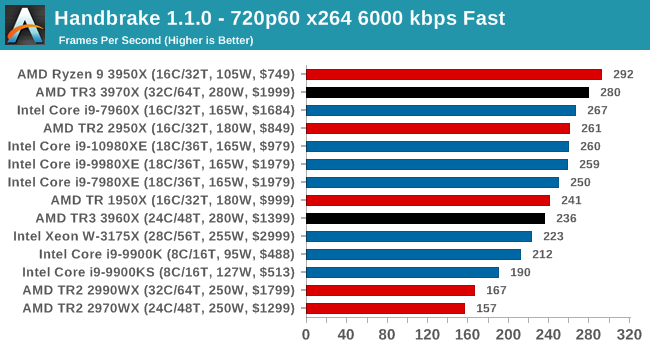
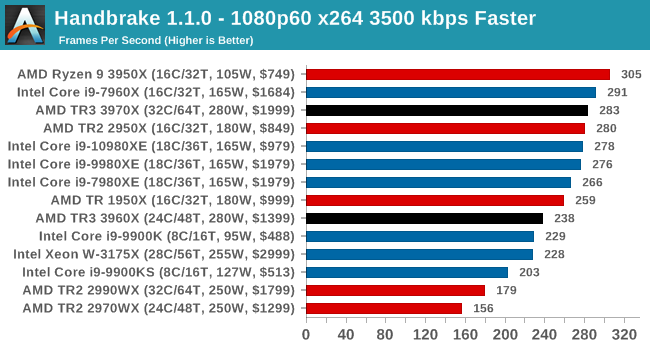
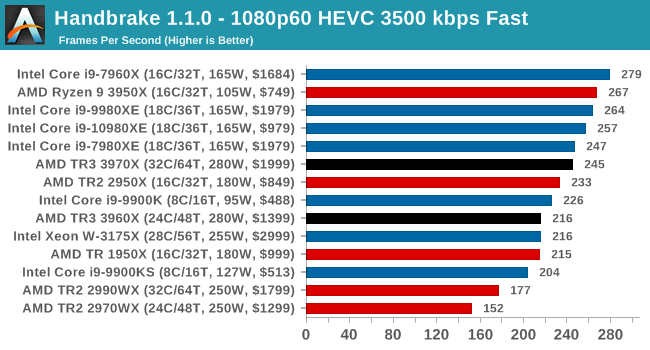
Video encoding is a little varied, based on the variable threaded nature. Certain encoding tests can be more memory sensitive here, or accelerated in different ways, or not scale well with more cores. Either way, TR3 performs a lot better than TR2, but the 3950X seems the best choice.
7-zip v1805: Popular Open-Source Encoding Engine
Out of our compression/decompression tool tests, 7-zip is the most requested and comes with a built-in benchmark. For our test suite, we’ve pulled the latest version of the software and we run the benchmark from the command line, reporting the compression, decompression, and a combined score.
It is noted in this benchmark that the latest multi-die processors have very bi-modal performance between compression and decompression, performing well in one and badly in the other. There are also discussions around how the Windows Scheduler is implementing every thread. As we get more results, it will be interesting to see how this plays out.
Please note, if you plan to share out the Compression graph, please include the Decompression one. Otherwise you’re only presenting half a picture.
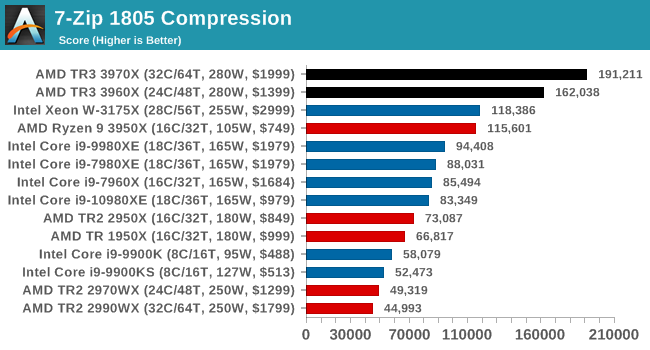
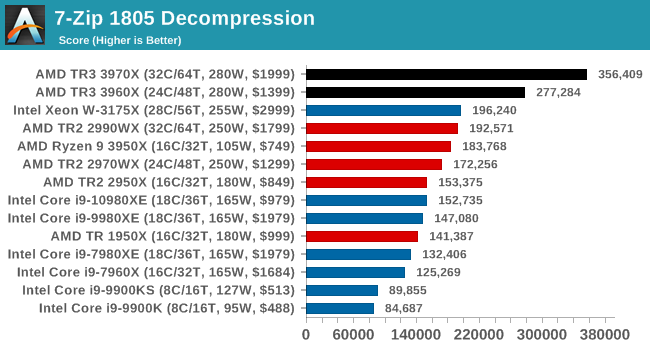
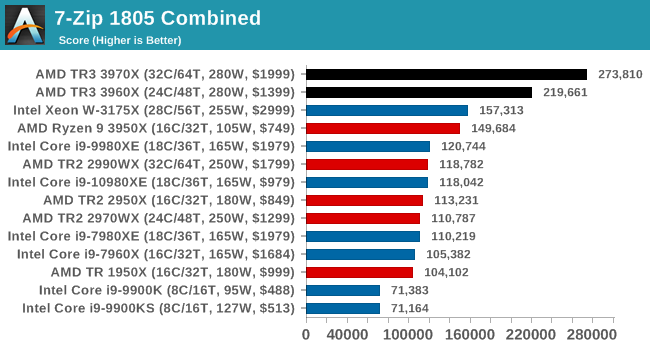
Easily parallel puts the TR3 well ahead of TR2 and Intel.
WinRAR 5.60b3: Archiving Tool
My compression tool of choice is often WinRAR, having been one of the first tools a number of my generation used over two decades ago. The interface has not changed much, although the integration with Windows right click commands is always a plus. It has no in-built test, so we run a compression over a set directory containing over thirty 60-second video files and 2000 small web-based files at a normal compression rate.
WinRAR is variable threaded but also susceptible to caching, so in our test we run it 10 times and take the average of the last five, leaving the test purely for raw CPU compute performance.
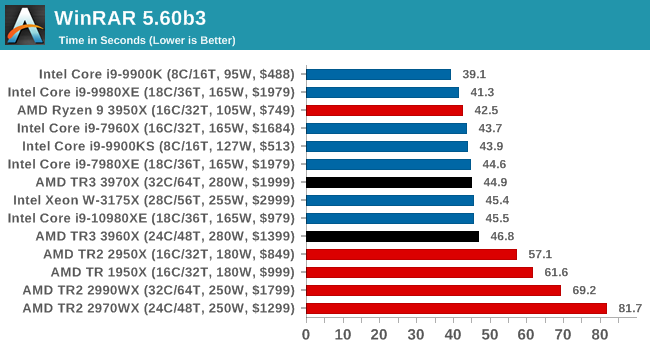
WinRAR is a variably threaded application, and both TR3 processors perform in the same ballpark as anything from Intel. Ideally we should have seen them streak ahead, but we seem to be at a point where CPU frequency or core counts are the limiting factor. At least with Zen 2, there are no issues as there was with Zen 1/Zen+.
AES Encryption: File Security
A number of platforms, particularly mobile devices, are now offering encryption by default with file systems in order to protect the contents. Windows based devices have these options as well, often applied by BitLocker or third-party software. In our AES encryption test, we used the discontinued TrueCrypt for its built-in benchmark, which tests several encryption algorithms directly in memory.
The data we take for this test is the combined AES encrypt/decrypt performance, measured in gigabytes per second. The software does use AES commands for processors that offer hardware selection, however not AVX-512.
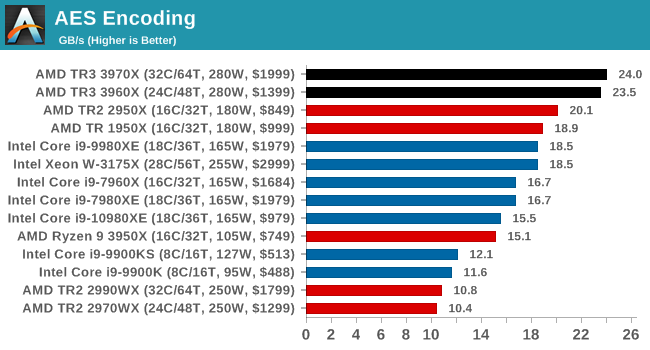










245 Comments
View All Comments
Slash3 - Tuesday, November 26, 2019 - link
AnandTech frustratingly doesn't seem to ever list their memory subtimings, but as they test at "JEDEC" standard, it may be as loose as 2933 CL19-19-19 vs your 2933 CL14. This could easily account for the difference in benchmark results.alufan - Monday, November 25, 2019 - link
So Thread ripper is here, I will never have a use for this chip but I want one...just because, probably the single biggest uplift in CPU performance for a great many years.Still 10 intel featuring articles on the main page vs 4 featuring AMD though, shame really and it would have been nice for you to have a proper dig at intel for its pathetic attempt to skew CPU bench results by moving the embargo forward, try taking a tip off linus man he told it like it was as have many others.
Grobert783 - Monday, November 25, 2019 - link
So many cores and yet no one cares PLUS we all know AMD sucks. Thank youyeeeeman - Monday, November 25, 2019 - link
LolXyler94 - Monday, November 25, 2019 - link
Ah yes, the infamous "Nobody cares" argument of a fanboy.And yet you cares enough to click the article, go to the comment section, and write this comment. I won't comment about your other comment though, clearly you didn't RTFA
darwi - Monday, November 25, 2019 - link
With so much cores Anandtech should consider virtualization benchmark/uses casesthere is some good automated Lab Scripts available.
On Windows Nested Virtualization is still not enabled on AMD Processor.
-> still not announced for Windows 20H1, perhaps for 2OH2 since major overhaul for Azure is underway.
Ryzen Master is still incompatible with VBS (Virtualization based Security).
This situation prevent to test some features in Windows VM :
- With more and more feature relying on virtualization (WSL, Security, workload isolation, ...)
- For advanced scenarios (Labs for testing infrastructure deployment, ESXi, hyper-v, compiler, etc...)
By ignoring the 1k segment AMD could overplay their advantages :
- the cpu is only a part of the package (you have to add a beefy psu and cooling system and a decent amount
of RAM) if you want to make a meaningfull use of such platform.
- the moherboad price take a major rise (Apple accessories manufacturer syndrom ?) - without high ends feature regarding connectivity
where are the multi-gig network and Thunderbolt ports ?, but RGB pins are plenty ...
- forcing the early TR adopters to a 2k-2,5k investment to jump to the TR3+ architecture (if cooler and RAM, PSU remain the same)
and chipset reset could do some damage too.
And finally the 10980XE (with more PCI 3 lanes, and more memory) will not be the best but enough and more affordable.
I'm a an owner of TR 1950X.
Questions :
> Nested Virtualization will eventually comming to AMD ? (for a future interview with AMD CEO/CTO)
> Air Cooling is it still suitable for TR3 ?
And thanx to Anandtech for those reviews and the worth of drilling down into details.
That's my 2cents.
Irata - Monday, November 25, 2019 - link
Wait, what ? The 10980XE has more PCIe lanes than TR3?And the rest...is pot legal where you live?
darwi - Monday, November 25, 2019 - link
I was comparing with the nearest AMD offrer to the 10908XE v: The Ryzen 3950X.Furthermore the PCI4 cards are very few for the moment.
May be there is some room for a TR3 3950X like the TR 1920 in his time.
The 1K is for 1K$.
lobz - Tuesday, November 26, 2019 - link
I usually don't do drugs but I'll have some from what you're having...Xyler94 - Monday, November 25, 2019 - link
In what world is 60 PCIe 4.0 lanes less than 48 PCIe 3.0 lanes?You do know... that PCIe 4 is backwards compatible, so Threadripper has effectively 60 lanes of PCIe 3, right? I don't know about you... but 60 is more than 48...